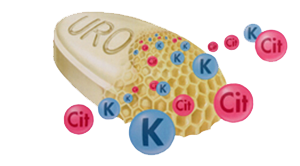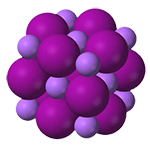Citrate Starting




How much Potassium Citrate do we need?
Familiarize yourself with the symptoms of high and low serum potassium. If we have normal kidney functioning our body needs to take in daily about 5 mEq per day of dietary potassium. Once near end stage renal disease this amount maybe decreased because our body, our kidneys no longer eliminates potassium and our serum potassium rises. Have your doctor in agreement with the addition of potassium citrate or sodium citrate to your regime. Try to discuss the danger for you with PKD not to use baking soda or sodium bicarbonate as an alkalizer. This increases the chance of developing kidney stones for PKD'rs. Six (6) to ten (10) tablets of over the counter OTC potassium citrate is equal to a daily prescribed dose of Urocit K or 15 mEq of potassium.
Your doctor will need to prescribe (Urocit K 5 or Polycitra syrup) potassium citrate. Over the counter Potassium or Sodium Citrate can be obtained inexpensively. There are dangers to taking too much potassium or sodium supplements without a doctor regularly checking your blood work for an elevated serum potassium.
Before starting potassium citrate, get a baseline serum potassium.
Before starting citrate salts have a urinary citrate level done. Get a 24 hour urinary citrate test done. Kidneys utilize citrate for energy. The result of your urinary citrate test should be generally low with PKD. Low citrate is to be expected with PKD and it is also found with high blood pressure.
After an initial potassium citrate get a serum potassium drawn twice a week, then every week, then every 2 weeks, then once a month, then every 3 months, then every six months, and whenever you just do not feel well. Familiarize yourself with the symptoms of high and low serum potassium.
Over-the-counter potassium supplements usually contain 99 mg. per tablet. Prescription potassium is usually measured in milliequivalents (meq.). To change mg of elemental potassium to mEq, take the number of mg and divide it by 39.0983 (atomic weight of potassium). 99 mg is approximately equal to 2.53 mEq. If you know the mEq, multiply by 39.0983 to find the elemental potassium. If you wish to take over the counter potassium citrate and your doctor prescribes 15 meq/day; this is approximately six (6) to ten (10) OTC tablets.
Potassium levels can become dangerously high either through taking too much; the kidneys not eliminating potassium; or through dehydration. This needs close follow up blood work. Animal PKD models received the equivalent of 15 mEq of potassium daily. This would be 6 - 10 OTC tablets if the potassium citrate tablets are 99 mg each.

If potassium citrate is coupled with an alkaline diet and nightly testing of urinary pH, generally no more than 1-3 tablets OTC (over the counter) potassium citrate are ever needed to swing you once again toward alkalinity. One tablet is about one and half milliequivalents - two milliequivalents of potassium. One doctor said that this is not enough to do much of anything and is of no consequence. Some feel it is a waste of money. However, if this small a dose results in raising urinary pH rise to 7.5 this is a sufficient dose. Sometimes if individuals take more than 3 OTC tablets they may experience intestinal cramping.
Sodium citrate and potassium citrate were equally effective alkalizers. Calcium citrate was less so. In the normal progression of PKD towards end stage renal disease, potassium rises. Many doctors oftentimes prescribe a favorite old standby, sodium bicarb, as an inexpensive alkalizer. However due to the inherent nature of PKD, this will lead to an increase in kidney stone formation, especially for PKD'rs. We already have a 20% increased risk of developing kidney stones. Taking sodium bicarbonate multiplies this risk. Ask your nephrologist if sodium citrate might prove beneficial for you. Not only is potassium citrate or alkalinity beneficial for PKD, there are some clinical trials that show it also helps lower blood pressure and improve bone density and diminish recurrent kidney stone formation. Citrate is utilized by the kidneys as energy.
Prescribed Tablets
UROCIT®-K 5 (540 mg) = 5 mEq
UROCIT®-K 10 (1020 mg) = 10 mEq
UROCIT®-K 15 maximum strength for twice daily dosing
UROCIT®-K from Mission® Pharmacal is available in controlled release tabs, UROCIT®-K 5 (540 mg) and UROCIT®-K 10 (1020 mg).
It's relatively inexpensive - 30 tablets of UROCIT®-K 5 costs $14.69 from Costco. Please be aware that enalapril (Vasotec),
an ace inhibitor often prescribed for high blood pressure can raise serum potassium.
Prescribed Syrups
PolyCitra-K is syrup which has 1100 mg of Potassium and 334 mg citric acid per teaspoon (5 mL)
Citra-K is a generic version of PolyCitra-K
Both are commonly sold in 480 mL bottles (a pint is 473 mL). A quick price check of online pharmacies
PolyCitra-K was $24-$30/bottle, while Citra-K was $14-$22/bottle.
How Can I Switch from Potassium Chloride to Potassium Citrate?
This depends on how much potassium chloride you are now taking. Below are some conversions.
UROCIT K 5 prescribing information has 540 mg = 5 mEq.
OTC over the counter Potassium Citrate 99 mg each
4 tablets OTC potassium citrate = 5 mEq.
